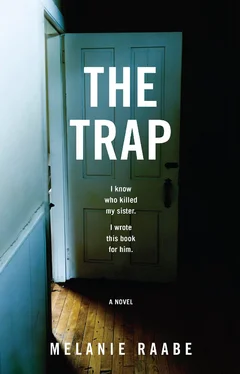Once again the weather has changed, and again the balance of power threatens to tip. Victor Lenzen is no longer cowering before me like a thrashed dog; he’s regained some of his self-confidence.
“I have an alibi,” he says.
We’re sitting in semi-darkness. The storm’s on its way. I can hear the thunder coming closer and closer, and I have a terrible feeling that something dreadful is going to happen when the storm reaches us. I brush the thought aside, telling myself that my grandmother was afraid of storms and communicated her fear to me; that it’s superstition and nothing more.
Lenzen is lying. He must be lying. I saw him.
“I have an alibi,” he repeats.
“How are you going to prove it?” I ask.
My voice sounds husky. Fear is creeping up on me, cold and merciless.
“I remember that summer,” Lenzen says. “2002. World Cup in Japan and South Korea. Brazil and Germany in the final.”
“How are you going to prove that you have an alibi?” I repeat impatiently.
“I flew to Afghanistan on 20 August,” Lenzen says. “I remember it very well, because my ex-wife’s birthday is 21 August, and she was pissed off because I was going to miss her party.”
My world begins to totter.
I grasp the pistol, steadying myself. Just another trick.
“How are you going to prove it?” I ask, forcing myself to breathe steadily.
“I was reporting daily at that time, on the ground. The deployment of German troops in Afghanistan was still relatively recent; people were interested in what was going on in the Hindu Kush. I accompanied some soldiers at close quarters; the reports should still be on the Internet — even today.”
I stare at him. Gooseflesh spreads over my body. I won’t believe him. He’s bluffing.
“Look it up,” says Lenzen with an encouraging glance at my smartphone, which is lying on the table in front of me, and I see through his trick. The bastard. He’s hoping for a brief moment of distraction to attack me again, to take the gun off me.
I shake my head and point my chin at Lenzen’s phone without loosening my grasp on the gun. I haven’t forgotten the rapid swooping movement with which Lenzen got over the table; I won’t be giving him another opportunity to do that.
Lenzen understands and picks up his phone. He begins to tap around on it.
I grow nervous. What if he wanted to get to his phone to call the police?
“Any funny business and you won’t leave this house alive.”
Scarcely have the words left my mouth before I give a mental start. Why should he want to ring the police if he’s Anna’s murderer?
You’ve stopped thinking straight, Linda.
Lenzen frowns at me and goes back to tapping. At length he looks up, an inscrutable expression on his face, and pushes his phone across the table to me. I pick it up, without taking my eyes off Lenzen. Then I lower my gaze and read.
Spiegel Online. I read, scroll, read again, scroll up, scroll down. Compare the names, the dates. Spiegel Online. Archive. Victor Lenzen. Afghanistan. 21 August 2002, 22 August 2002, 23 August 2002, 24, 25, 26, 27, 28 August 2002.
I read and read, over and over again. My brain’s searching for a way out.
“Linda?”
I scroll up and down.
“Linda?”
I hear his voice as if through cotton wool.
“Linda?”
I look up.
“How was your sister killed?”
My hands are trembling like an old woman’s.
“How was your sister killed?” Lenzen repeats.
“She was stabbed seven times,” I say, as if in a trance. So much anger. And the blood — blood everywhere.
I don’t know whether I say it out loud or only think it.
“Linda,” says Lenzen, “you’ve got the wrong man. Please think about it.”
I can hardly concentrate on what Lenzen is saying; it’s all going too fast for me; I’m lagging three steps behind, still trying to come to terms with the fact that Lenzen has just come up with an alibi. It’s not possible, it’s just not possible.
“Get it clear in your head what that means,” Lenzen says, speaking slowly and quietly, as if he were trying to charm a poisonous snake. “You’re not seeing justice served if you shoot me. On the contrary: no matter what you do to me, the true murderer is still out there somewhere.”
That hits me like a bullet. But who was it, if it wasn’t Lenzen?
No. No. No. I saw Lenzen.
“Linda?” says Lenzen, jolting me out of my thoughts. “Please put the gun down.”
I look at him. At last I begin to understand.
From 21 August 2002 until at least 28 August 2002, Victor Lenzen was in Afghanistan. He had no opportunity to kill my sister.
My head aches, I feel dizzy, and I think to myself that it’s been going on for such a long time now: the pain, the dizziness, the hallucinations, the song — that damn song — the shadow in the corner of my bedroom, the sleeplessness, the blackouts. I understand, and the realization is incredibly painful.
I am mad.
Or well on the way to becoming so. That is the truth. That is my life.
The effects of extended isolation include sleeping disorders, eating disorders, cognitive impairment and even hallucinations. I read a lot — I know that kind of thing.
The panic attacks, the trauma, my tendency to lose myself in stories, my guilty conscience at not having been able to save Anna, my years of loneliness. It all makes sense. But that doesn’t make things any better.
The man facing me is innocent. All the things he said that I interpreted as references to the murder were no more than comments on fictional characters and a work of literature.
What have you done, Linda?
My throat aches. It’s tears rising — I remember the feeling, even though I haven’t cried for a good ten years.
I give a dry sob. Everything is spinning. The ceiling is suddenly full of insects, like a creeping, teeming carpet. I’m losing control. For a moment I forget who I am, or what I’m called and what’s going on. I’m so confused. But there is a voice.
“Put the gun down, Linda.”
Lenzen. It’s only now that I become aware of the weight in my hand again, the gun.
Lenzen gets up, approaching me cautiously.
“Put the gun down.”
I hear him as if through cotton wool.
“Keep calm,” he says. “Keep calm.”
It is over. I have no more strength. My horror at what has happened — at what I have done — overwhelms me. The phone drops from my hand and clatters to the floor. I’m trembling all over. My muscles no longer function; I slide off the chair — I would fall, but Lenzen catches me, holds me, and we go down together and sit there on the floor, gasping, sweaty, frightened. Lenzen holds me and I let him; I am numb, I am stunned; I have no choice but to let it happen. I wait, sitting it out. I am a knot — a woman-shaped knot, hard and tight. But then something happens: the tectonic plates of my brain shift and, slowly, the knot loosens, and I begin to cry. I sob and tremble in Victor Lenzen’s arms, I dissolve in his arms, salt in the sea. My brain is racing, it can’t process physical proximity; it isn’t used to it, although it’s been hankering after it for a good ten years. Lenzen’s body is warm and firm, he is taller than me, my head fits into the hollow between his throat and his chest. I whimper. I don’t understand why he’s doing what he’s doing. I let him hold me, I feel connected, alive, and the feeling almost hurts. Then he eases himself away from me, and once more I feel the ground disappear from beneath my feet.
Lenzen gets to his feet, looks down at me. I’m drifting, trying to get ahold on the shore.
“But I saw you!” I say feebly.
Читать дальше












